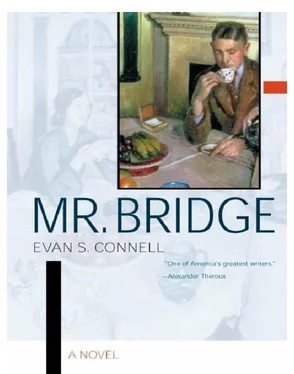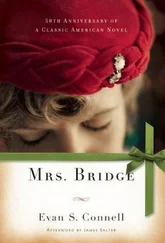Easter morning the children wandered around the house and the yard with little wicker baskets looking for the chocolate eggs Mrs. Bridge had bought and for the hard-boiled eggs which they themselves had decorated and which she had hidden. In the garage Carolyn found the rabbit. His pen was an orange crate with a piece of chicken wire across the top and he was nibbling a shred of lettuce when she saw him and let out a screech of pure joy.
They named the rabbit Thumper. He was a healthy, mildly inquisitive, normal rabbit, utterly useless, and they spent the rest of the morning pushing lettuce and carrots at him. Mrs. Bridge went around collecting the undiscovered hard-boiled eggs, somewhat puzzled that they had managed to find all of the chocolate eggs. Mr. Bridge, after contemplating the children and their rabbit for a few minutes, went back to the house to read the Sunday paper.
But while he was reading the paper he wondered again what would happen. He suspected that the rabbit would catch distemper or pneumonia. The previous Easter the children had begged for some baby chicks, so Mrs. Bridge had bought a dozen at the grocery store, but they had not lived long. They were dyed as bright as Japanese lanterns and probably the dye had penetrated the skin. At any rate, they began falling over. All twelve were dead within a week, and he had a persistent feeling that the rabbit was not going to have much better luck.
Thumper expired sooner than he expected. Before noon. Jock, the Sealyham from the next block, came trotting into the garage and was driven mad by the sight and odor of the rabbit. Douglas kicked at the Sealyham and grabbed it by the collar, Ruth swatted it with a broom, Carolyn screamed and ran into the house for help; but by the time Jock was dragged out of the garage the rabbit was almost dead. It lay on the stained and pellet-spotted newspaper and its ribs went up and down like bellows. The water cup had been turned over, the lettuce was scattered. The Sealyham had lunged against the crate so hard that several of the slats were splintered.
The dog had not gotten its teeth into the rabbit, but Mr. Bridge, bending down and looking closely at the rabbit’s eye, guessed that death was on the road. Carolyn, weeping, pleaded with him to get a bottle of limewater, for she had heard somewhere that limewater was a sovereign cure for ailing rabbits. But neither limewater, nor any other remedy, would save this Easter bunny.
About thirty minutes later Thumper was dead. Mrs. Bridge took the children into the house.
That a creature could die of terror, and nothing except terror, was something Mr. Bridge found difficult to believe. Yet this was precisely what had happened. It disgusted him a little. He disliked weakness. He wrapped the carcass in a page of newspaper and threw the bundle in the garbage can. He did not blame the dog, which had acted according to nature. And if the dog had not destroyed the rabbit something else would have gotten it. Pets were difficult to keep in a city. The dog itself had been hit and nearly killed by a car a few months ago.
So be it, he thought, as he put the lid on the garbage can. The day may come when I will wish for a death as painless and quick.
Douglas, winking significantly, stood on the roof of the house. Ruth, a black-haired grandmother, lay voluptuously on her back in a garden while thirty or forty children crawled over her body like bugs.
He awoke. His forehead was damp. He felt chilled and sick at his stomach. Trembling, he got out of bed, went into the bathroom, and looked at himself in the mirror. Then he sat on the toilet and held his head in his hands. The dream meant that the children were going to grow up and live as they pleased, leaving him to grow old and die. He tried to recall if Carolyn had appeared in the dream, although that was not important: the inference of two children was enough. He did not want to die and there seemed to be no reason that he must. He was happy, everybody in the family was happy, therefore this life ought to continue indefinitely. Suddenly his heart began flopping back and forth. He could feel it throbbing beneath his ribs like a fish at the end of a line. Protectively he cupped his hands over his heart, expecting a terrible hot stroke. But after a while the violent beating subsided.
He waited a few minutes, then got up and washed his face and remained standing in front of the mirror. He wondered if he ought to wake his wife and have her drive him to the hospital; however, since there was no pain, he decided he was all right.
He thought again about the dream. He could imagine no other interpretation. Sooner or later he was going to die, while the children went on living.
“Are you all right?” Mrs. Bridge inquired. She stood at the door of the bathroom. He had been staring so intently into the mirror that he had not seen her.
“Should I call Dr. Stapp?” she asked.
“I have a slight stomach upset,” he said. “Go back to bed. I’ll be there soon. You have nothing to worry about.”
16 Struggling Upward & Other Works
A few nights later he was wakened again in the middle of the night, this time by the realization that his wife was not in bed. He opened his eyes and listened. The house seemed unnaturally quiet. He turned his head on the pillow and looked out the window and saw that it had begun to snow. Just then she returned, slipped off her robe, and got into bed.
“Carolyn was crying,” she whispered.
“What about?” he whispered.
“She was afraid a star might fall.”
He smiled and shut his eyes. He remembered the fears he used to have. He remembered that he had cried himself to sleep many nights because he believed that on the day he became twelve years old he would be forced to leave home and seek his fortune. He could not recall how he had gotten this idea but there was a picture in his mind, which must have come from some magazine or illustrated book: a boy was leaving home with a stick over his shoulder and a few things tied up in a bandanna on the end of the stick. The boy’s parents stood in the doorway of a cottage. The mother was weeping, the father was trying to comfort her, and the boy, too, was very sad. Now it seemed as ludicrous as Carolyn’s fear, but once upon a time nothing had been more real.
Every week a large picture puzzle appeared in the window of Thayer’s: an elaborate drawing of a jungle filled with an intricate assortment of nearly concealed birds, beasts, and hunters. The neighborhood children looked for these figures and reported to the druggist how many they had found, and every Saturday somebody won a silver dollar. Ruth, when she was younger, had entered this contest from time to time but never won the prize. Now she was no longer eligible. Carolyn, however, had begun to win the dollar often enough that Mr. Thayer looked up sourly from his work of filling prescriptions each time she walked into the drugstore.
At last Mr. Thayer had had enough. One Friday afternoon when she located every animal, bird, snake, butterfly, pygmy, and hunter in his jungle he disqualified her. Carolyn was dumbfounded; she glared at him and her face turned red, then she ran out of the drugstore hysterical with rage and ran all the way home and told her mother what the druggist had done. Mrs. Bridge was disturbed not only because Carolyn was in such a state of emotion but because she, too, felt the druggist had been unfair. Not knowing exactly what to do, she waited until her husband came home from the office.
He listened to what she said, then he called Carolyn into the study and listened to her account. He inquired if she did not think she had won often enough. Maybe, he suggested, she ought to let other children win the prize.
Читать дальше












